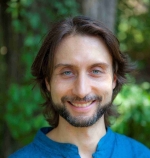About the Centre
The Centre for Human Flourishing (CHF) is dedicated to advancing the quality of lived experience in human systems through innovative learning opportunities, change initiatives and action research.
Vision

To be a university-based leader in fostering transformative change that enables individuals, organizations and communities to flourish in an interconnected, equitable and sustainable world. We envision a future where our engagements and action research empower people to realize their full potential, cultivate resilience, and contribute to the collective well-being of humanity and the planet.
Mission
Promoting human flourishing through transformative engagements and research that empower individuals, organizations and communities to evolve and contribute to a thriving, interconnected world in inclusive, equitable, and sustainable ways.

Goals
- To enhance capacities of individuals, organizations and communities to tap into their creative resources as they navigate novel and challenging realities within human systems.
- To support communities of practice through colloquia, training and consultation as they advance initiatives for system development and human flourishing.
- To engage in action research programs that create new understanding of how change optimally occurs and the requisite competencies of change agents in promoting such change.
Team

Jim Gavin
PhD, ABPP, MCC, IMC Centre Director
Jim Gavin is a certified master coach and licensed psychologist who has taught and practiced over the past 50 years. He is deeply committed to the development of human potential and the evolution of human consciousness. His practice focuses on individual, team and organization development experiences.
As well, Jim is a full professor in the Department of Applied Human Sciences, and co-designer of the internationally renowned Human Systems Intervention graduate program at Concordia. He also serves as the Education Director for JMEC’s Professional Coach Development programs.

Nicolò F. Bernardi
PhD, PCC, Program Coordinator
Nicolò Bernardi serves as Coordinator of the Centre for Human Flourishing, where he bridges research and practice to advance the Centre's mission of transformative engagement and systemic change.
Drawing on over a decade in cognitive neuroscience, studying how people learn, change, and transform, and extensive experience as a coach and facilitator, Nicolò translates cutting-edge research into impactful and actionable programs. He convenes spaces where researchers, practitioners, and community members collaborate on real-world applications of human flourishing.
Nicolò has served over a thousand coaching clients through profound life transitions, contributed to cutting edge research on coaching effectiveness, and supports the Presencing Institute's global research work in awareness-based systems change.
A former professional musician and father of two, he brings curiosity about the full spectrum of human experience to his work at the Centre.
Board of Directors

Dr. Don de Guerre, with a Ph.D. in Human and Organizational Systems, joined Concordia in 1999 after a distinguished international career in consulting and management across various sectors, focusing on participative governance, open systems theory, and advancing action research, while also holding several notable research and leadership positions.

Dr. Steven Henle, a full-time faculty member in Applied Human Sciences at Concordia since 2004, focuses on improving human happiness through leisure and recreation; drawing on his doctoral research and experience as executive director of Adopt-A-Playground Corp, and emphasizing andragogy and experiential learning, he has been recognized for innovative teaching and student retention.

Dr. Raye Kass, a Professor of Applied Human Sciences at Concordia University since 2012, spearheads group theory courses, has extensively redesigned many counseling and group theory courses, was instrumental in creating the Human Systems Intervention program, authored "Theories of Small Group Development," and serves as an advisor to the Mars One Project, bringing her vast expertise in group theory and human systems intervention to her teaching, consulting, and advisory roles.

Dr. Warren Linds, a full-time faculty member at Concordia since 2004 and graduate program director of the Human Systems Intervention masters, brings his extensive background in international development education, community media, and popular theatre to his teaching, integrating practical experience with theoretical approaches, and has published and presented widely on group facilitation, anti-oppression pedagogy, youth leadership, and arts-based qualitative research.

Dr. Randy Swedburg, who joined Concordia after studies in Minnesota and Idaho and teaching in Illinois, served as a professor in Applied Human Sciences for 28 years and co-founded a faculty-staff shinny hockey league. A past president of the American Association of Leisure and Recreation and active in the Elderhostel movement with his wife, Judy, Swedburg has significantly contributed to student scholarships and directed the Centre for Human Relations and Community Studies and the Centre for Mature Students.


